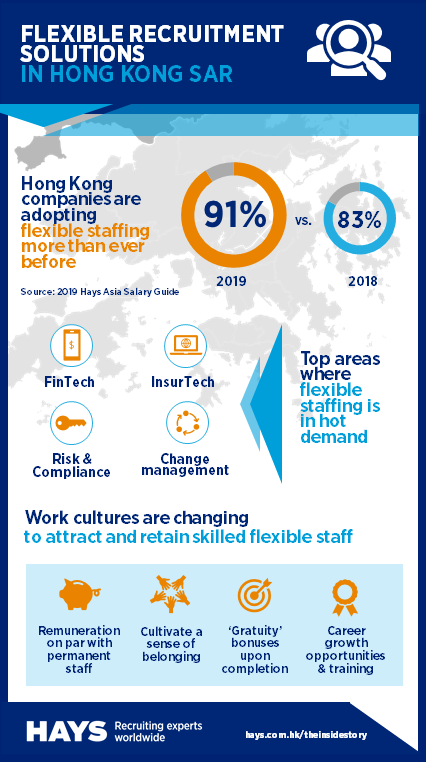The Inside Story of Flexible Recruitment Solutions in Hong Kong SAR

While 2019 has undoubtedly been an eventful year for Hong Kong, the region has seen a surge of digital transformation, financial innovation and regulatory changes that have kept its job market active and on the path to progress. However, the rapid pace and degree to which these changes are taking place has created a need for highly qualified individuals who are as flexible and adaptable as they are specialised in a domain. When combined with a significantly slowing economy that has brought cost control to the forefront, these market conditions have lent to a record number of organisations – particularly within IT, fintech, banking and insurance – turning to flexible recruitment solutions (contracting or temporary workers) to suit their dynamic needs.

Labour market overview: A time of both challenge and opportunity for Hong Kong
Despite having faced impacts from geopolitical tensions such as the US-China trade war that contributed to a national recession on par with the financial crisis in 2008, Hong Kong’s strategic location and unique significance in the region will likely help maintain its status as a global centre for finance. This is evident by the ongoing FinTech boom in Hong Kong that culminated in the Hong Kong Monetary Authority (HKMA) recently issuing a total of eight virtual banking licenses to, “facilitate financial innovation, enhance customer experience and financial inclusion,” in the words of the HKMA’s chief executive, Norman Chan Tak-lam.
The ripple effect of these developments has been significantly positive for the contracting/temporary job market, as Sally Poon, Senior Team Leader for Hays Hong Kong, explains, “The rise of virtual banks, startups, automation, digitalisation and transformation projects have impacted the workforce dynamic by not only changing the nature of traditional job roles but also how organisations want to hire for them. Traditional permanent recruitment is no longer the sole or primary solution for filling the skills gap as organisations are now more receptive to other talent delivery models like flexible recruitment solutions.”
According to data from the Hays Asia Salary Guide 2019, companies in Hong Kong are utilising the flexible recruitment sector more than ever before, with 91 per cent of organisations stating they had employed temporary or contract staff in the last year, up from 83 per cent in 2018. This a trend that is likely to continue alongside market disruption according to Matt Hayes, Senior Department Manager for Hays Hong Kong. “The one thing consistent across Hong Kong is that the pace of change for many different industries and markets has increased. As a result, many different organisations will need a more flexible workforce that can keep up with this change. So whether its flexible and specialised talent, or business-as-usual people – all hiring activity will be driven by the pace of change, whether that’s technological change or business.”

Skills in demand: IT, data science, and soft skills
Owing to the ongoing digital transformation across industries, a rich FinTech landscape and the rise of InsurTech in Hong Kong, contractors or temporary workers with specific technical skill sets are among the most wanted and highest paid candidates at this time. Most of these roles are mid-senior level and fall within cyber security, project management, DevOps, IT engineering, and data analysis/science.
Among these, data is fast becoming the most important resource most companies can use to help dictate their strategy and grow their business. Within this space, data architects and engineers who have experience building data pipelines in a cloud environment are highly sought after, particularly for those with experience in platforms like AWS, Azure and Google Cloud. As more companies finish building out their data lakes and subsequently, have better quality data to work with, the demand for data scientists who can use this to draw meaningful insights has also increased exponentially. Candidates with experience in Python and/or R who also have experience with Machine Learning or NLP libraries are the amongst the most wanted in the market.
However, technical skills alone no longer fit the remit, as Sally explains, “Feedback and open communication is increasingly encouraged, particularly between technical professionals and users or stakeholders. Organisations are looking for a ‘middleman’, such as a business analyst or project manager, with the soft skills to articulate technical subjects in a way that senior management can understand.”
Compliance and change management are the need of the hour
Risk & compliance is another sector that is seeing more flexible hiring activity, particularly within banking, owing to the slew of regulatory changes and the rarity of this skill set in the market. The gradual decrease of jobs from Western banks in the market has also coincided with increased hiring from Chinese firms – making language skills in Mandarin and an understanding of Chinese working culture more important than ever for many employers.
Within non-IT or commercial sectors such as insurance and finance, there is a huge demand for change management skills, much of which is due to changing regulations as well. Within insurance, there is currently a heavy emphasis on implementing IFRS 17 standards as well as driving digital transformation amidst an influx of InsureTech startups and in-house departments. Financial services companies are looking for candidates who can help drive business improvement projects across all levels, with common hires including business analysts, project managers, program managers, or “anyone who can deliver some form of change,” says Matt. Agile delivery is the most wanted skill for such roles, putting contracting/temporary candidates with agile experience and certification around Scrum Master at the top of the priority list for many employers.

Work cultures are changing to welcome contractors
As the benefits of flexible recruitment solutions become increasingly evident, more employers are making significant changes to attract and retain skilled contracting/temporary employees. This begins with ensuring contracting employees are remunerated on par with permanent staff, and even ensuring they have the same amount of benefits like annual leaves. In addition, as Sally explains, “Most employers also offer a completion bonus, which is sometimes called ‘gratuity’. We often push hard and encourage our clients to offer these bonuses as they are an important element in incentivising and retaining contracting/temporary staff.”
Creating a work culture that welcomes contractors and makes them feel a sense of belonging to the organisation is another crucial improvement becoming more commonplace in Hong Kong. This ranges from involving them in corporate activities to providing career growth opportunities and training. “I have worked with many contractors that motivate themselves by staying on the cutting edge of their industry is. High demand in the market has led contracting/temporary workers to be more selective about jobs as well as more conscious about working with firms that value their contributions,” says Matt. More companies are also encouraging internal transfers after a specific project ends, for example, where contractors can go on to take up permanent or contracting roles in other teams.
More employers in Hong Kong are also consulting with recruitment agencies, who are often the legal employers of contracting/temporary staff, on ways to integrate, motivate and retain their staff. “We engage with our staff on a monthly basis and employers often depend on us to deliver messages to them. We try to do as much as possible to bring the hiring manager and contractor together, often strategising with a candidate on their next move or using our knowledge of the employer to help them win favour and progress in their current roles.”
With such initiatives in place, the future is bright for candidates and organisations open to flexible recruitment solutions. The current era of digital transformation will continue to introduce technologies that will not only change how products and services operate, but how they are integrated into every-day lives. These changes are likely to result in an unprecedented amount of new positions and projects suited to those looking to expand their networks, build project experience and maintain work life balance.
If you would like to discuss this report in more depth or you wish to discuss your job search or recruitment needs, please email Sally Poon at Sally.Poon@hays.com.hk or Matt Hayes at Matt.Hayes@hays.com.hk.
